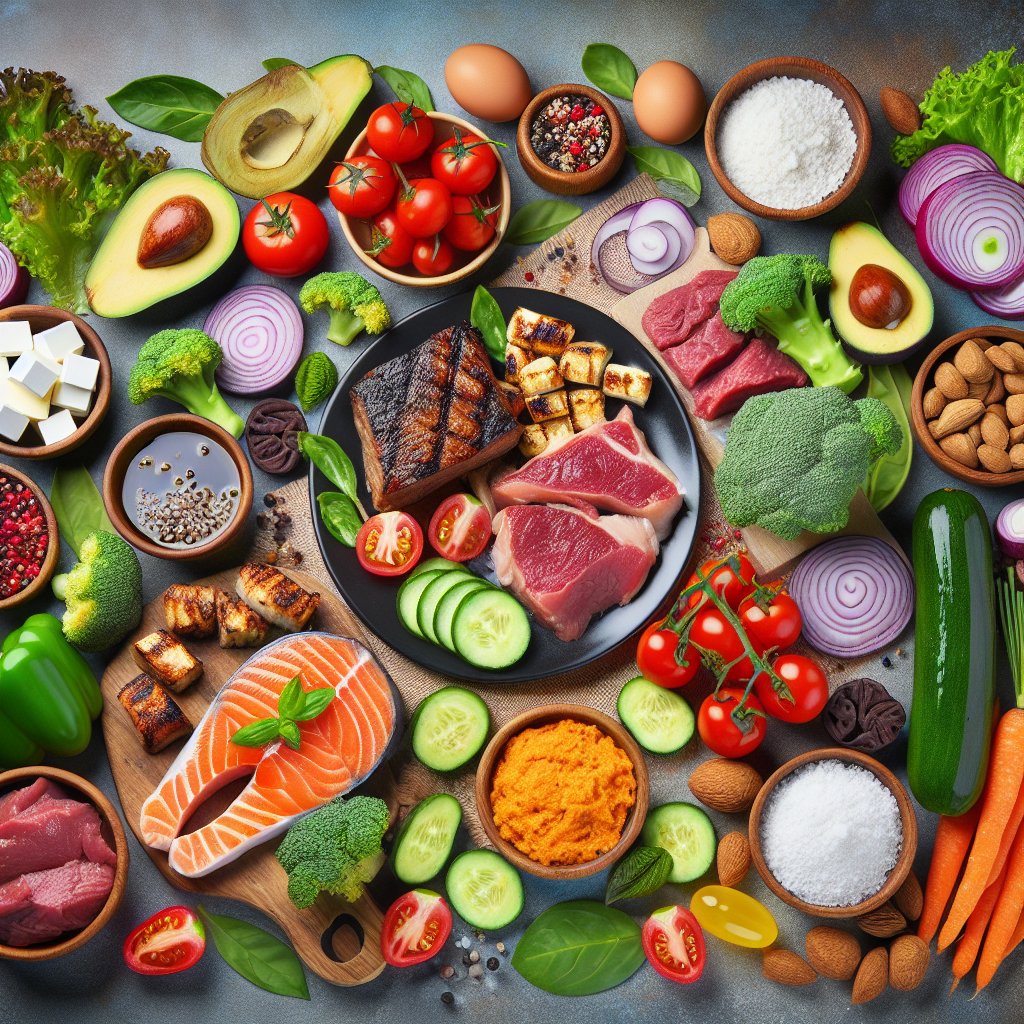Maximizing Your Keto Results: How Much Meat Can You Eat on the Keto Diet? Find Out Now!
Why the Keto Diet Is So Popular
Have you ever wondered why the keto diet has gained so much attention and popularity in recent years? It seems like everywhere you turn, someone is raving about the incredible results they’ve achieved through keto. Well, the truth is, it’s not just a passing fad. The ketogenic diet has solid scientific backing and has been proven to offer a host of health benefits, including weight loss, improved energy levels, and better mental focus.
One of the key factors that make the keto diet so effective is its unique approach to nutrition. Unlike traditional diets that focus on low-calorie or low-fat intake, the keto diet emphasizes high-fat, moderate-protein, and low-carbohydrate consumption. This macronutrient ratio is designed to shift the body’s metabolism into a state of ketosis, where it burns fat for fuel instead of relying on glucose from carbohydrates.
Research has shown that this shift in metabolism can lead to rapid and sustainable weight loss, making the keto diet an attractive option for those looking to shed excess pounds. Additionally, the focus on consuming healthy fats and keeping carbohydrate intake low can also lead to significant improvements in markers of metabolic health, such as blood sugar levels and cholesterol profiles.
With the growing body of scientific evidence supporting its effectiveness, it’s no wonder that the keto diet has captured the attention of so many people seeking a sustainable and practical approach to achieving their health and wellness goals.

Benefits of Keto Diet
Hey there, keto enthusiasts! Today, let’s talk about the amazing benefits of the ketogenic diet. If you’ve been considering trying out keto, or if you’re already on the journey, you’re in for a treat!
Weight Loss
One of the most sought-after benefits of the keto diet is weight loss. Research published in the Journal of Clinical Endocrinology & Metabolism found that people on a ketogenic diet lost 2.2 times more weight than those on a calorie-restricted low-fat diet. This is pretty exciting, right?
Improved Blood Sugar Levels
Another fantastic benefit is the positive impact on blood sugar levels. A study in the journal Nutrition & Metabolism reported that the keto diet can lead to significant improvements in glycemic control. This is excellent news for individuals with diabetes or those looking to stabilize their energy levels throughout the day.
Increased Energy
Have you ever heard of the keto flu? It’s a common experience when transitioning to keto, but once you get past that phase, get ready for a surge in energy! A study in the European Journal of Clinical Nutrition found that the ketogenic diet resulted in enhanced physical and mental performance in athletes, making it a winner for those seeking a natural energy boost.
So, if you’re feeling motivated to kick-start your keto journey, the potential benefits are truly exciting. Weight loss, improved blood sugar levels, and increased energy are just a few of the positive changes you may experience. Keep reading for more insights on how to make the most out of your keto diet!
Importance of Protein on Keto
Protein is a crucial component of a keto diet, playing a key role in maintaining muscle mass and promoting satiety. When it comes to weight loss and overall health on a keto diet, meeting your protein requirements is essential. Protein has been shown to increase metabolic rate and reduce appetite, making it a powerful tool for weight management.
Research has revealed that a higher protein intake can aid in preserving lean body mass, which is particularly important when following a low-carb, high-fat diet like keto. A study published in the American Journal of Clinical Nutrition found that individuals on a ketogenic diet who consumed a higher proportion of protein were better able to maintain muscle mass compared to those with lower protein intake.
Furthermore, protein plays a crucial role in satiety, helping you feel full and satisfied after meals. This is particularly beneficial when following a keto diet, as it can aid in controlling cravings and preventing overeating.
So, when considering how much meat you can eat on keto, it’s important to focus on achieving your protein goals while being mindful of your overall caloric needs and macronutrient balance.

Meat Consumption on Keto
One of the key elements of the keto diet is consuming a sufficient amount of protein while keeping carbohydrate intake low. Meat is a fantastic option for achieving this balance. It is not only rich in high-quality protein but also naturally low in carbs, making it an ideal choice for those following a ketogenic lifestyle. Research indicates that a moderate intake of protein can support muscle growth and maintenance, making it crucial for overall health and wellbeing.
So, how much meat can you eat on keto? You can enjoy a generous amount of meat on the keto diet, all while reaping its numerous benefits. Based on a standard 2,000-calorie diet, it is recommended to aim for about 100-120 grams of protein per day, and meat can certainly contribute significantly to reaching this target. Keep in mind that different types of meat vary in their protein and fat content, so it’s essential to mix things up with options such as lean chicken, fatty fish, and beef to attain a well-rounded nutrient profile.
Moreover, the satiating effect of protein is well-documented, which can help in managing appetite and promoting a feeling of fullness. This can potentially aid in weight management and adherence to the keto lifestyle. So, next time you’re at the grocery store, feel confident in stocking up on a variety of meats to power your keto journey!
Types of Meat Allowed on Keto
So, you’re on the keto diet, and you’re wondering, “How much meat can you eat on keto?” The good news is that meat is a staple in the ketogenic diet. Here are various types of meats that are keto-friendly:
Poultry
Chicken and turkey are excellent sources of protein and are low in carbohydrates, making them perfect for the keto diet. Whether you’re enjoying a grilled chicken breast or some succulent turkey meatballs, you can indulge in a variety of poultry options.
Beef
Beef is a versatile and satisfying option for keto enthusiasts. Whether it’s a juicy steak, ground beef in a delicious stir-fry, or a comforting beef stew, there are numerous ways to enjoy beef while staying in ketosis.
Pork
From bacon to pork chops, the keto diet welcomes pork with open arms. Just be mindful of any added sugars in processed pork products, as these can sneak in some unexpected carbs.
Seafood
Fish and shellfish are not only delicious but also incredibly nutritious, providing essential omega-3 fatty acids and protein. Salmon, shrimp, tuna, and sardines are just a few examples of seafood that can be enjoyed while following a ketogenic lifestyle.
Research has shown that incorporating a variety of meats into the ketogenic diet can help maintain muscle mass and support overall weight loss. It’s essential to choose high-quality, unprocessed meats whenever possible.
Remember, it’s not just about the quantity of meat you eat on keto but also about balancing it with other essential nutrients like healthy fats, low-carb vegetables, and adequate hydration. So, go ahead, savor your favorite meats, and maximize your keto results!

Recommended Meat Portions on Keto
When following a keto diet, meat becomes a staple in many people’s meals. However, it’s crucial to strike a balance when it comes to the amount of meat consumed. Scientifically, the ideal amount of meat that can be consumed daily or per meal while following a keto diet depends on various factors such as individual macronutrient needs, activity level, and overall health goals. Here are some guidelines to help you navigate meat consumption on the keto diet.
Understanding Protein Needs
Protein is an essential macronutrient that plays a critical role in the keto diet. It helps in muscle repair, satiety, and overall body function. According to a study published in the American Journal of Clinical Nutrition, it is generally recommended that adults consume 0.8 grams of protein per kilogram of body weight per day to maintain muscle mass and overall health.
Portion Control
While meat is a valuable source of protein and fat, it’s important to be mindful of portion sizes. A serving of meat that is roughly the size of the palm of your hand or a deck of cards is a good guideline to start with. Consuming larger portions may lead to consuming excess protein, which can be converted into glucose through a process called gluconeogenesis, potentially impacting ketosis.
As a rough estimate, a moderately active woman may aim for a palm-sized portion of meat per meal, while more active individuals may need slightly larger portions to meet their protein needs without overdoing it.
Ultimately, it’s essential to listen to your body and consider individual factors such as hunger levels, energy needs, and activity levels when determining the ideal amount of meat to consume while following a keto diet.
By being mindful of protein needs, practicing portion control, and being attentive to individual factors, you can optimize your meat consumption on the keto diet for the best results.
Quality of Meat for Keto
When following a ketogenic diet, the quality of the meat you consume can have a significant impact on your overall health. Emphasizing the importance of choosing high-quality, lean cuts of meat can help minimize saturated fat intake, supporting your keto goals.
Research has shown that opting for lean cuts of meat can help reduce the intake of saturated fats, which are linked to an increased risk of heart disease and other health issues. High-quality, grass-fed beef, for example, contains higher levels of omega-3 fatty acids and lower levels of saturated fats compared to conventionally raised beef, making it a healthier choice for those following a keto lifestyle.
When selecting poultry, choosing skinless chicken or turkey breasts over dark meat can also help reduce saturated fat intake. Fish, such as salmon and mackerel, are excellent sources of protein and healthy fats, making them ideal options for those on a ketogenic diet.
By being mindful of the quality and type of meat you consume, you can enjoy the benefits of a keto diet while minimizing potential health risks associated with high saturated fat intake. Making informed choices about the quality of meat you eat is a key aspect of optimizing your keto results.

Potential Risks of Excessive Meat Consumption on Keto
While the ketogenic diet offers numerous health benefits, it’s important to be mindful of the amount and types of meat consumed. Excessive meat intake can potentially pose certain risks, particularly in relation to saturated fat and cholesterol levels.
Research has shown that a high consumption of red and processed meats, common staples in the keto diet, can lead to increased intake of saturated fats. This can contribute to elevated levels of LDL cholesterol, which is a risk factor for heart disease.
When considering how much meat you can eat on keto, it’s crucial to strike a balance. While meat is a valuable source of protein and essential nutrients, too much of it, especially the fatty cuts, can tip the scales in favor of unhealthy saturated fat intake.
Fortunately, there are ways to mitigate these potential risks while still enjoying a meat-rich ketogenic diet. Opting for lean cuts of meat, such as skinless poultry, and incorporating fish, tofu, and plant-based protein sources can help diversify your protein intake without overloading on saturated fats.
Additionally, focusing on whole food sources and incorporating plenty of low-carb vegetables can create a more well-rounded ketogenic eating plan, reducing the potential impact of excessive meat consumption on cholesterol levels.
By being mindful of portion sizes and choosing a variety of protein sources, you can harness the benefits of the keto diet while minimizing the potential risks associated with consuming too much meat.
Balancing Meat with Vegetables on Keto
When it comes to the keto diet, it’s easy to get wrapped up in the protein and fat components and forget about the vegetables. But did you know that incorporating non-starchy vegetables is essential to balance out the protein intake from meat?
Studies have shown that non-starchy vegetables play a crucial role in a ketogenic diet. They are low in calories, high in fiber, and packed with essential nutrients, such as vitamins, minerals, and antioxidants. These vegetables help in filling you up, improving digestion, and providing essential micronutrients to support overall health.
Adding non-starchy vegetables like leafy greens, broccoli, cauliflower, zucchini, and bell peppers to your meals can help create a sense of balance, providing a wide array of nutrients while keeping the carb count low.
Incorporating these veggies not only adds variety and color to your meals but also ensures that you are getting the fiber your body needs to keep everything running smoothly. Research has indicated that a high-fiber diet can have numerous health benefits, including better digestion, weight management, and improved gut health.
So, while it’s important to enjoy your protein-packed meals, don’t forget to load up on those non-starchy veggies. They play a crucial role in providing the balance your body needs to thrive on a keto diet.
Consulting a Healthcare Professional
Before diving into any significant dietary changes, it’s crucial to consult with a healthcare provider or a nutritionist, especially if you have specific health conditions. While the ketogenic diet has gained popularity for its potential health benefits, it may not be suitable for everyone.
Research has shown that consulting a healthcare professional before starting the keto diet can help individuals optimize their results and minimize potential risks. For example, a study published in The Journal of Nutrition emphasized the importance of personalized nutrition guidance to ensure the ketogenic diet is safe and effective for individuals with different health concerns.
Health conditions such as diabetes, heart disease, or kidney issues can significantly impact how the body processes a high-protein diet like keto. Therefore, seeking professional guidance can help individuals with these conditions understand how much meat and other protein sources they can consume while following the keto diet without compromising their health.
If you’re considering the keto diet and have pre-existing health conditions, it’s essential to work alongside a healthcare professional to tailor the diet to your specific needs. They can provide personalized advice on how much meat you can eat on keto, taking into account your health status, goals, and dietary preferences.
Ultimately, the guidance of a healthcare provider can ensure that your journey on the keto diet is not only effective in achieving your goals but also safe and sustainable for long-term health and well-being.
Conclusion: Finding Balance and Moderation
When it comes to meat consumption on the keto diet, the key lies in finding a balance that works for you. As we’ve explored, meat can be a valuable source of protein and essential nutrients on a ketogenic diet. However, it’s crucial to approach it with moderation and mindfulness.
Research has shown that excessive intake of red and processed meats may have potential health risks, including an increased risk of cardiovascular disease and certain types of cancer. On the other hand, incorporating a variety of lean meats, poultry, and fish can provide the necessary nutrients without the associated risks.
For optimal results on the keto diet, it’s essential to focus on quality over quantity when it comes to meat consumption. Opt for grass-fed or pasture-raised meats whenever possible, as they tend to have higher nutrient levels and healthier fat profiles. Additionally, balancing your meat intake with an abundance of low-carb vegetables and healthy fats can help mitigate any potential negative effects.
Striking a Balance
So, how much meat can you eat on keto? The answer lies in finding your individual balance. While there’s no one-size-fits-all approach, listening to your body’s signals and prioritizing variety and moderation can lead to long-term success on the ketogenic diet.
Ultimately, enjoying a diverse range of nutrient-dense foods while keeping an eye on portion sizes can help you maximize your keto results without compromising your overall well-being. Embracing mindful eating and a balanced approach to meat consumption sets the stage for a sustainable and fulfilling ketogenic lifestyle.


